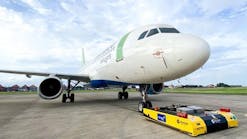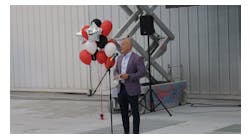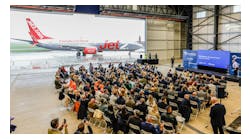What is the "Right Stuff" for Aviation Maintenance Professionals?
The origin of this article stemmed from a discussion between Ron Donner and the author. The discussion was about this year’s AMT Next Gen Awards Top 40 Under 40 aviation maintenance professionals. We acknowledged our respect for the multitude of nominees and those named on the list. We talked about the character traits that promoted their nominations. They are the behavior and personal traits that will likely ensure their continuing success in our industry.
How to Make a List of Traits?
When your job title is chief scientist and technical advisor you try and use data to answer questions. Therefore, I made a list of 50 traits down column A of a spread sheet. Across the rows I listed five personal friends and/or professional colleagues that I respect. I thought that I could check boxes and narrow the list of 50 traits to about 10 and then have enough data for this short article. That sounds easy, however, I found that I checked most of the boxes for everyone on the list. Therefore, I needed a “Plan B.” For that plan I decided to make two short lists of five each, important for aviation maintenance personnel. One list considers easily observable behavior. The second list focuses on desirable personal and professional competence characteristics. I’m guessing that the two lists describe the AMT Next Gen 40 Under 40 Award winners, but it works for anyone.
This brief consideration of observable behavior and traits spares the reader of psychological mumbo-jumbo. Instead, it merely provides an avenue to consider factors that contribute to success as an aviation maintenance professional.
Beauty is Only Skin Deep – Or is It?
In the May 2017, AMT, I wrote about “The Role of Maintenance in Corporate Customer Service.” Portions of that discussion apply here. Five selected behaviors and five selected traits are listed below. The behaviors are observable. You can speak with a person and watch them work daily within the organization to see behavior. The behaviors are like “Beauty,” you can see it and it comes in many forms. Character traits drive behavior but are more intangible taking more time to assess.
Table 1: Five Selected Behaviors and Traits
Behaviors
Hard Working
Projects Passion for the Job
Appears to Enjoy the Work
Communicates Clearly
Demonstrates Reliability
Competence/Characteristics
Technically Competent
Professionalism
Results-Oriented
Decision-Making Ability
Integrity
Considering Behaviors
People with the “Right Stuff” usually appear determined to work hard. They elicit that familiar remark, “She is a hard worker.” They seem to understand the work challenge and then set order and priorities to complete each task. They are always looking for the next assignment or, better yet, the intuit of the next part of the job and proceed on course. Applying logic and common sense helps ensure that hard workers are also smart workers.
Of course, we all like co-workers that have a passion for the occupation. We want our co-workers to recognize and appreciate the importance of aviation not only in the local and world economy but also in the way that travel affects personal/family connectivity. Workers with a passion for aviation know that their work affects the pleasure and safety of everyone that travels by air. That is important. We should feel good about it. It means that we see our presence at work as far more than a way to earn a paycheck. Passion for the job affects how we approach the entire work day and each task during the day. When a worker has this passion they appear to enjoy their work and take pride in the proper completion of every task.
A demonstrated behavior to communicate clearly is necessary for success. Clear communication is important for all levels of aviation maintenance and engineering. A good communicator is able to ask the right questions and also to provide clear answers to others. A good communicator should be willing and able to reasonably negotiate when necessary. They should be able to convey their opinions and be assertive in issues that affect quality and safety.
Reliability is a critical observable behavior. It could be something as basic as daily on-time arrival and accompanying full fitness for duty. Reliability can depend on the choice to be 100 percent compliant with company procedures and with all technical instruction for aircraft maintenance work. Aircraft maintenance often requires team work and high trust of co-workers. Demonstrated reliability, therefore, is an important factor for success in the field of aviation maintenance.
Sometimes it is difficult, or not necessary, to differentiate between demonstrated behavior and personal traits. From a training perspective it is easier to change behavior than to affect inherent personality traits. Long-term behavioral change can transfer into a trait. For example, if a person is taught how to engage in risk-based decision-making behavior they can continuously use that process until it becomes a trait.
Competence/Characteristics
The right column in Figure 1 lists the competence/characteristics of a successful aviation worker. These competencies are likely to be established over time and are not as easily recognized with quick observations of behavior.
First on the list is technical competence. If a worker is repairing and returning the aircraft to service the immediate measure of technical competence would be the proper training, experience, and the necessary license/certificate/rating from the appropriate national aviation authority. Depending on the country and the mechanic rating there is a wide range of proven technical competence that is ensures by the rating. Technical competence is usually based on proper certification in conjunction with depth and recency of experience. It also relies on the worker to use the proper tools, approved parts, company procedures, and manufacturer’s instructions. A technically competent mechanic/engineer always uses the proper technical documentation and knows how to apply and learn from the documentation.
Professionalism is a combination of competencies and behaviors that encompass both columns of the list. The aviation maintenance professional always strives for the highest quality work and for continuous improvement. A professional should not be confused with a perfectionist. The professional knows and achieves the acceptable level of quality and practical efficiency. Professionals often serve as mentors to help others as well as themselves.
To a large extent one can observe some professional demeanor/attitude. That can be manifested by the personal clothes they wear, the cleanliness of their corporate uniform, the trim of their beard or pony tail, to their general posture, and overall physical demeanor. These outward physical manifestations are often an indication of the worker’s professionalism. While appearance is not everything it is a likely first and often long-lasting impression.
Being results-oriented is a trait that contributes to success. Everyone on the 40-under-40 list is not a certificated mechanic. Aviation maintenance organizations have analysts; logistics professionals; quality and industrial safety specialists; managers; marketing, sales and financial personnel; training departments; human resources; payroll; and so much more. All team members must combine efforts to get the job done. The very best of them are results oriented. They make sure that the priorities are set so the job gets done properly/safely, on schedule, on budget, and to the customer’s satisfaction.
Good decision making, is critical to all aspects of aviation maintenance. In the atmosphere of safety management systems, the concept of risk-based decision making is crucial. This important trait and moment-by-moment decision making is not new to mechanics. Every maintenance activity requires decisions about part wear, acceptable tolerances, parts replacement, fluid level or renewal, and much more. The best maintenance personnel use all available resources to make hundreds of decisions daily.
Saving a very critical trait for final discussion is integrity. Rest assured that the AMT Next Gen Award nominees and awardees are all examples of high integrity. That trait must never be an option in aviation maintenance. Without integrity people can get hurt; high value equipment can suffer damage/loss; and companies can fail. Also, the FAA can fine you or suspend your necessary work credentials. Integrity ensures that individuals and their companies do the “right thing” all the time.
Making a List is Dangerous – Try it Yourself
Making a list dooms you to some failure. You leave someone or something important from the list. Lists can become too long to read or too short to have value. The good news is that lists make you think. You ask if the list contained the right stuff? Was the list in the right order? Were the words properly selected? No matter the answers to these questions this list reminded me that our extremely safe and critically important international industry relies on behaviors and competencies of which we should be proud. I complement AMT Magazine for their annual acknowledgement of AMT Magazine’s Next Gen Award 40-under-40 aircraft maintenance professionals.





